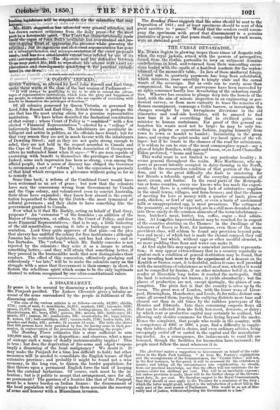!" qu"',"•','""" 'THE 1:11111N DE V ASTATOR.:! clnki it s ,`,Ittha z 'depicts in glowing tropes
those times of despotic rule IThe.- the roYal jaakalar armed with the powers of prerogative, is* the 6othie portcullis to levy on subjacent domains I. ,..ialeind, end/ returned froni.their mutilating exeur- vith[the 'ispoils off a tkuildred market:vibe, the replen- ,yaonarch'e table,• 'In lieu of-those yiidia3val forays, sap ;in quarterly payments has long been aubstitu ioh ministers more smoothly to kingly state' and the c wants of the sovereign. But as evils can be rarely more than compromised, the ravages of purveyance have been succeeded by an aphis consumer hardly less devastating of the suburban rurah- ties. Whoever has occasion to plunge deep into the bowels of the land, with the aim of minute inspection in an engineering or geo- &cake' survey, or from mere curiosity to trace the remains of a Roman encampment, rummage a Celtic barrow, or investigate the changes wrought by late ferruginous diversions in the old itineraries and road-side hostelries, will be amazed to find how bare it is of everything that in civilized guise can minister to human sustenance. For proof of this general ex- haustion his wants need not be large : he may be only tra- velling in pilgrim or equestrian fashion, jogging leisurely from town to town or hamlet to hamlet ; luxuriating in the green lanes, and eyeing the quiet nooks and ivy-laced spires of the vil- lages : but if he trusts to the chances of the road for subsistence, it is seldom he can be sure of the most commonplace repast—say a glass of bright Bonifaee, with eggs and bacon, or, as Lord Chancellor Eldon preferred, " beans and bacon." This woful want is not limited to any particular locality ;' it seems general throughout the realm. Miss Martineau, who ap- pears at present intently occupied in dairy-farming in the North, testifies to the resourceless condition of that portion of the king- dom, and to the great difficulty she finds in mustering for her friends a tolerable spread of the everyday consumeables of meat, cream, and butter. In the rural parts of the Metropoli- tan or home counties, every one knows who has made the experi- ment, that there is a corresponding lack of substantive supplies in the small towns, villages, and farm-houses; and that the chance of meeting for love or money with a quarter of lamb, piece of pork, chicken, or fowl of any sort, or even a basin of unskimmed milk or unappropriated egg, is most Rrecarious. The cottages of the peasantry, as may be expected, are in a still more denuded state : into these rarely do the common aliments of the town inhabitancy— beer, butcher's meat, butter, tea, coffee, sugar — find admis- sion. At leaebthis impoverishment may be vouched for in respect of the counties abutting on the Thames : in the dwellings of the labourers of Essex or Kent, for instance, even those of the more provident class, will seldom be found any provision beyond pota- toes and meal ; of which last is made the eternal compost they call "pudding," but which, without eggs or other needful element, is no more pudding than flour and water can make it. At first sight this may appear a somewhat incredible representa- tion ; it may appear extraordinary that in a country reputedly so opulent such a condition of general destitution may be found, that if an invading host were to try the experiment of a descent on the Kentish or Sussex coast, it is doubtful, unless it came well provided with the munitions of subsistence as well as of war, whether it would not be compelled by famine, if no other mischance befell it, to sur- render at discretion long before it reached the metropolis. Still the land is notoriously not barren; it yields abundantly; but the places of production are not, except sparingly, the places of con- sumption. The plain fact is that the country is eaten up by the towns. The great wen of London, with the lesser wens of Liver- pool, Birmingham, Manchester, and Leeds, do for miles distant cos. same all around them, leaving the outlying districts more bare and cleared out than in old times by the ruthless purveyors of the . Henries and Edwards. Into these consuming emporia flows all that can be collected from the field, hen-roost, dovecote, or dairy; by which rent or productive capital may certainly be realized, but allowing only slender commons for those living beyond the smoke. Hence the complaint, that people who reside in the country, with a competence of 4001. or 500/. a year, find a difficulty in supply- ing their tables ; all that is choice, and even ordinary articles, being sweepingly railed off or carted to the capital and the manufactur- ing nuclei. As a consequence, the inducements to rural life are lessened, though the facilities for locomotion have increased; for people must follow the meat wherever it is.


























 Previous page
Previous page